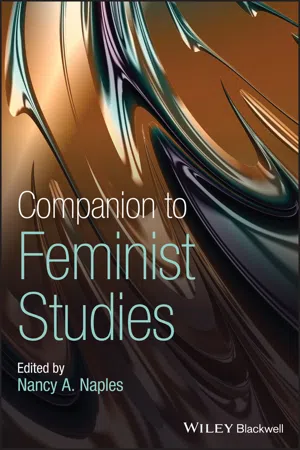
- English
- ePUB (mobile friendly)
- Available on iOS & Android
Companion to Feminist Studies
About This Book
A comprehensive overview of feminist scholarship edited by an internationally recognized and leading figure in the field
Companion to Feminist Studies provides a broad overview of the rich history and the multitude of approaches, theories, concepts, and debates central to this dynamic interdisciplinary field. Comprehensive yet accessible, this edited volume offers expert insights from contributors of diverse academic, national, and activist backgrounds—discussing contemporary research and themes while offering international, postcolonial, and intersectional perspectives on social, political, cultural, and economic institutions, social media, social justice movements, everyday discourse, and more.
Organized around three different dimensions of Feminist Studies, the Companion begins by exploring ten theoretical frameworks, including feminist epistemologies examining Marxist and Socialist Feminism, the activism of radical feminists, the contributions of Black feminist thought, and interrelated approaches to the fluidity of gender and sexuality. The second section focuses on methodologies and analytical frameworks developed by feminist scholars, including empiricists, economists, ethnographers, cultural analysts, and historiographers. The volume concludes with detailed discussion of the many ways in which pedagogy, political ecology, social justice, globalization, and other areas within Feminist Studies are shaped by feminism in practice. A major contribution to scholarship on both the theoretical foundations and contemporary debates in the field, this volume:
- Provides an international and interdisciplinary range of the essays of high relevance to scholars, students, and practitioners alike
- Examines various historical and modern approaches to the analysis of gender and sexual differences
- Addresses timely issues such as the difference between radical and cultural feminism, the lack of women working as scientists in academia and other research positions, and how activism continues to reformulate feminist approaches
- Draws insight from the positionality of postcolonial, comparative and transnational feminists
- Explores how gender, class, and race intersect to shape women's experiences and inform their perspectives
Companion to Feminist Studies is an essential resource for students and faculty in Women's, Gender and Sexuality Studies, Feminist Studies programs, and related disciplines including anthropology, psychology, history, political science, and sociology, and for researchers, scholars, practitioners, policymakers, activists, and advocates working on issues related to gender, sexuality, and social justice.
Frequently asked questions
Information
Part I
Introduction
1
Feminist Studies as a Site of Critical Knowledge Production and Praxis
Introduction
The roots of Feminist Studies lie in the study of women's experiences and a critique of their neglect in knowledge production. But the name “Feminist Studies” reflects the fact that the subject matter includes more than women: research and teaching focus on the ways that relations of gender, intersecting with race, class, ethnicity, sexuality, nationality, age, religion, ability, and other categories of difference, are embedded in social, political, and cultural formations. Feminist Studies encompasses teaching and research interests in men and masculinities and sexualities, as well as women.(Feminist Studies n.d., UCSB)
The Diversity of Epistemologies, Methodologies, and Feminist Praxis
a theory which describes that there are fundamental personality differences between men and women, and that women's differences are special … Underlying this cultural feminist theory was a matriarchal vision – the idea of a society of strong women guided by essential female concerns and values. These included, most importantly, pacifism, co‐operation, non‐violent settlement of differences, and a harmonious regulation of public life.(Tandon 2008, p. 52)
Table of contents
- Cover
- Table of Contents
- Title Page
- Copyright Page
- About the Editors
- Notes on Contributors
- Acknowledgments
- Part I: Introduction
- Part II: Feminist Epistemology and Its Discontents
- Part III: Methodological Diversity
- Part IV: Feminist Praxis
- Index
- End User License Agreement